Hello Teacher Tappers! One more week until another bank holiday weekend. Keep going 🙂
In the meantime, we’ve been repeating a beloved question from earlier in the year. Back in January we asked teachers to pick one of three trade offs: top exam results, well-being for colleagues, or £1 million in their bank account.
1. What if a Genie offered you….?
Most of you (unsurprisingly) picked the £1 million, however a teacher at the time suggested we should try and lower the price until we got a 50:50 split, which is apparently how the NHS works out the value of certain things.
So we dropped the price to just £10k aaandd… 54% of you would still take the cash over the results or well-being.

As per the last time we asked, the only group who act very differently are headteachers. Primary ones are much more likely to select total well-being for their colleagues (awww), and secondary ones are more likely to select top results for pupils (which may sound like they want to game the performance tables but is most likely because they know the results impact heavily on pupils’ lives).
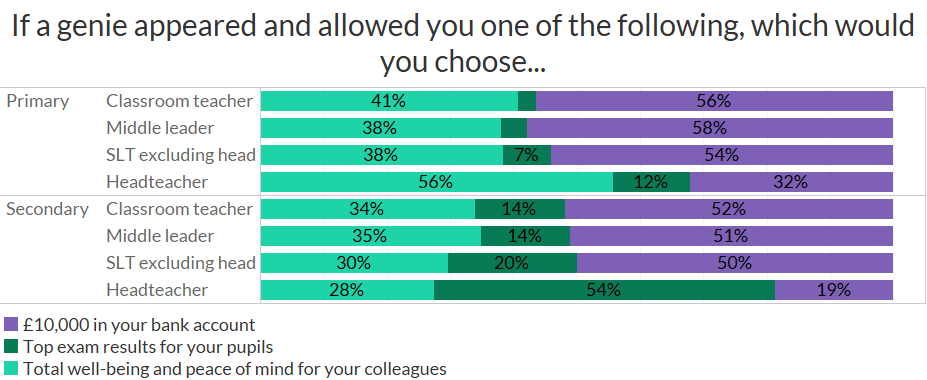
2. New GCSEs: Are they any good?
It is now a few years since the new GCSE specifications started. Views have been mixed as to whether or not they are better or worse than the old specifications. But in what way are they better or worse and how much does it vary by subject? A lot, it turns out!
Are they better preparation for A-levels?
When it comes to preparation for higher level study, maths, science, and MFL teachers are the happiest about the new GCSE specifications. English teachers are the least happy (though, on balance, are more happy than not).

Oddly, however, for all the maths and science teachers are more likely to think the new GCSEs are better preparation for A-levels, the level at which they like the new specs is much closer to the English teachers.
English teachers are less effusive than others, though it’s worth noting that given all the concerns the most common answers is that teachers somewhat like the new specs. So at least there’s that!

What about GCSE choice?
Another set of murmurs is that students now have less choice in their GCSEs than they did a few years ago because Progress 8 and the budget cuts have combined to reduce options. Ministers have mostly insisted that option choices are not dropping. Those ministers appear to be wrong.
While most pupils in independent schools appear to have the same GCSE choices as they did two years ago, for state schools located in the poorest areas around half have cut back on the number of courses.
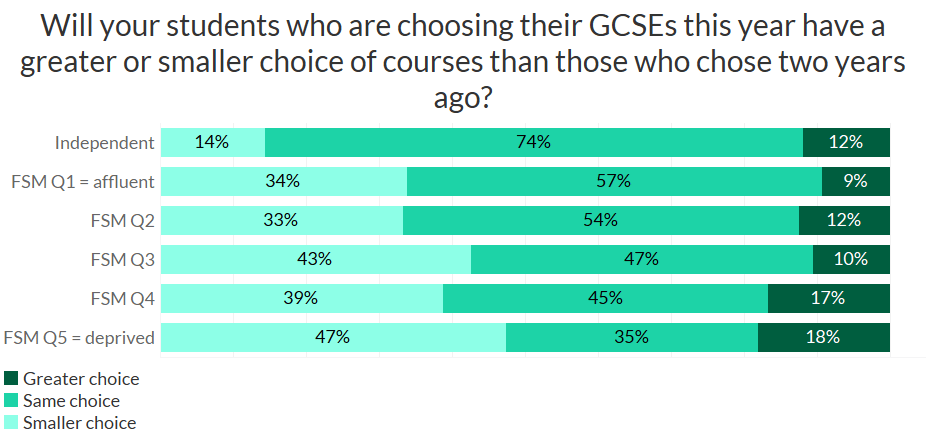
Fewer choices correlates even more heavily with poor progress in schools. That is, schools with the lowest Progress 8 scores are the ones cutting back most heavily on their subjects. In many ways, this makes sense. If you can cram pupils to get higher grades in a smaller number of subjects then it positively impacts on Progress 8. Does it do any good for the subjects that tend to get abandoned, such as music? More on that here.
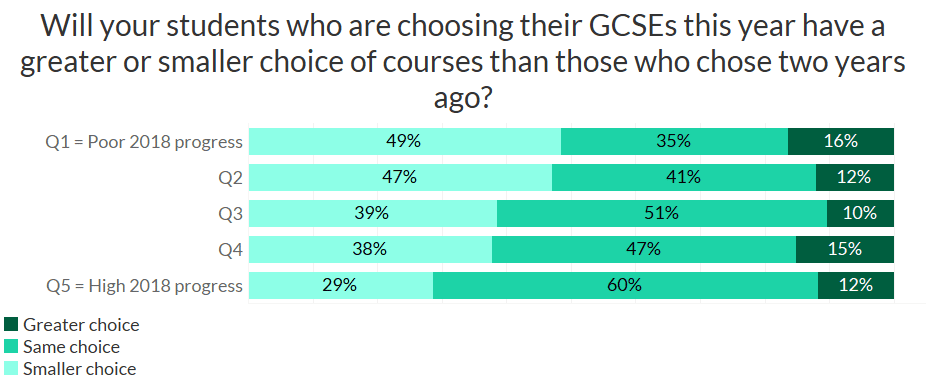
3. Who gets an attendance award?
Attendance awards are controversial things. Schools are under pressure to meet a national 95% rate for pupil attendance. It therefore makes instinctive sense to incentivise turning up at school. But rewards for attendance can negatively impact pupils who, through no fault of their own, have to miss schools for, say, regular hospital appointments.
Many of you said your school does reward attendance. In schools located in the poorest areas around 90% give out attendance awards.
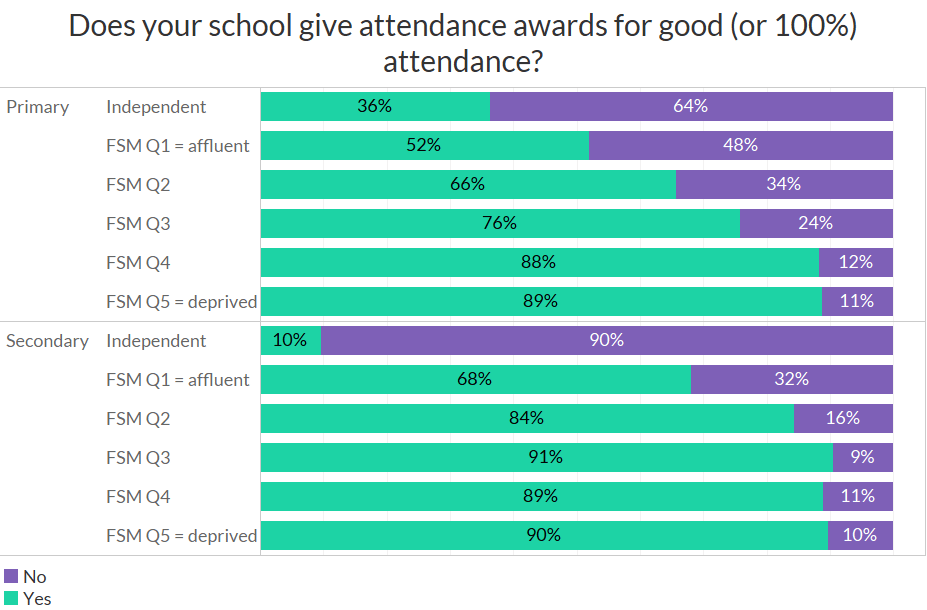
Schools therefore believe attendance is very important. Yet, we also have a tendency to get pupils doing all kinds of random things rather than being in their lessons. For example, children are sometimes used to do ‘tasks’ for teachers rather than being in lessons (putting up displays or working on reception).
When we asked, you told us that pupils were sometimes missing from your lessons for sports commitments or because they had been generally excluded from lessons.
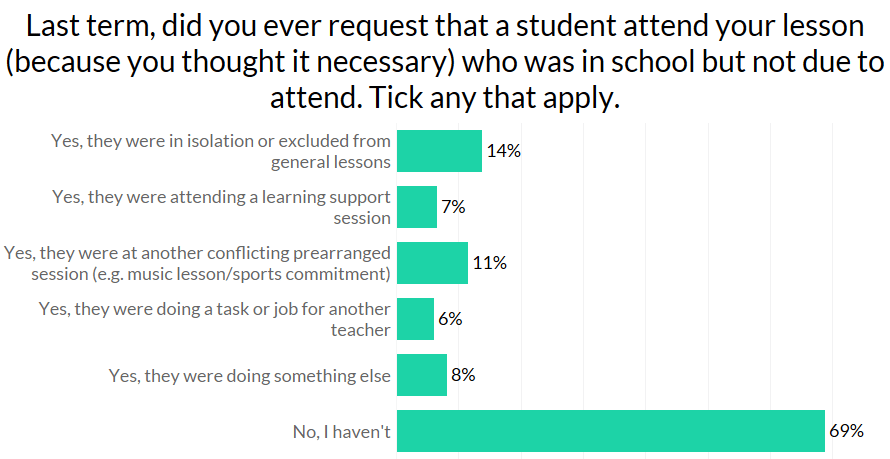
And we can see that it is the schools in the poorest area (FSM Q5), and so are particularly likely to say they value attendance, where pupils are most likely to be sent for because they are doing other things – including being in music/sports commitments or running errands.

Ultimately, schools do need pupils to attend, but we should be careful not to presume that simply because children are in school that they are also in lessons. This may not be the case!
4. SATs Easter Revision Classes?
Easter revision lessons for GCSEs have been a thing for well over a decade. But what about for SATs?
This year, 11% of primary teachers said their school hosted a SATs booster/revision session during the holidays!

And it was the outstanding schools who were most zealous of all. This is somewhat surprising, as outstanding schools tend to worry slightly less about their performance as they are exempt from future Ofsted inspections. However, they may be concerned that if the results dip, then an inspector will turn up.

Indeed, we found that a poor 2018 progress score made a school twice as likely to have SATs booster/revision classes, so it could be that leaders who already have an outstanding grade, but saw their results dip last year, are now looking to ensure good grades are achieved this year.
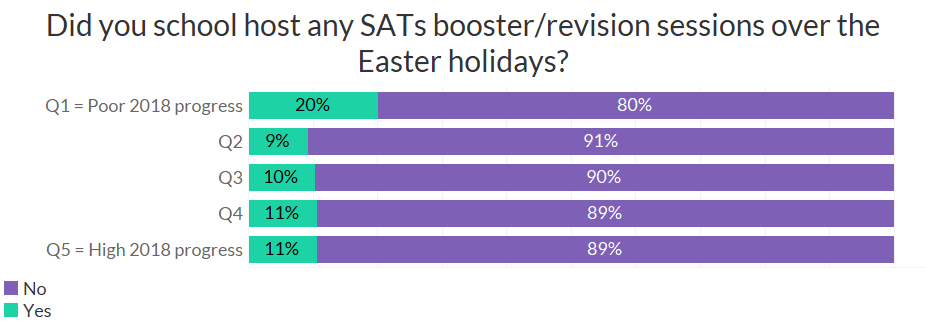
There is also a substantial regional effect, with London and the East Midlands coming out much higher than other groups. Any theories for this one? We are out.
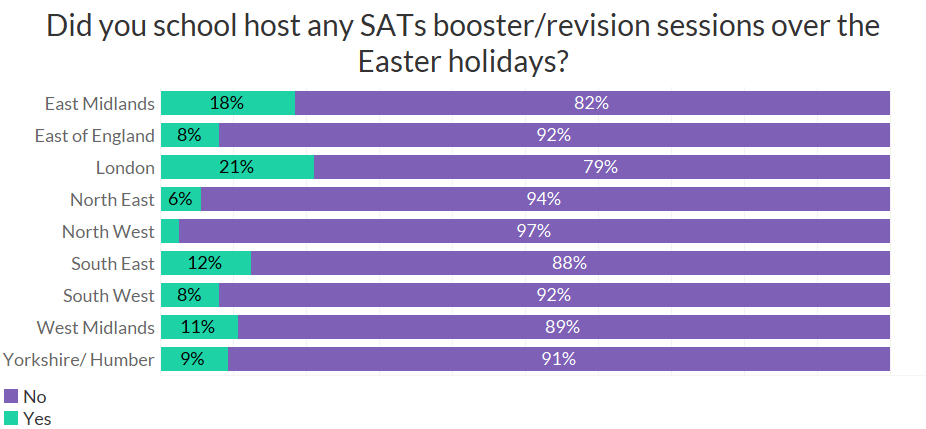
5. The Life Of A Primary Pupil
Education secretary Damian Hinds is very concerned that pupils get to have lots of diverse experiences. He’s in luck! Our primary teachers this week showed the vast range of trips, cultural experiences, and tasks that kids do in their classes.
For example, 88% of Year 6 teachers said their pupils will go on a residential trip this year. And 67% of Year 2 teachers said their pupils will watch a play, concert or musical.
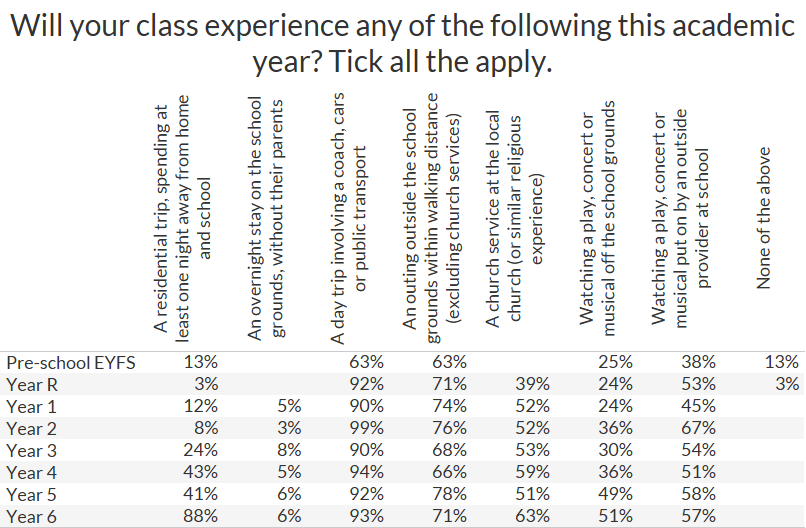
Schools minister Nick Gibb will also be pleased to find out that in any given week during the spring term, pupils are getting spellings to learn, reading books sent home, and some kind of maths homework, with a particular focus on times tables in Year 3 as expected). Though he might be slightly grumpy that around a third of children also get ‘project-based’ homework. (Nick Gibb is not a man who likes projects.)
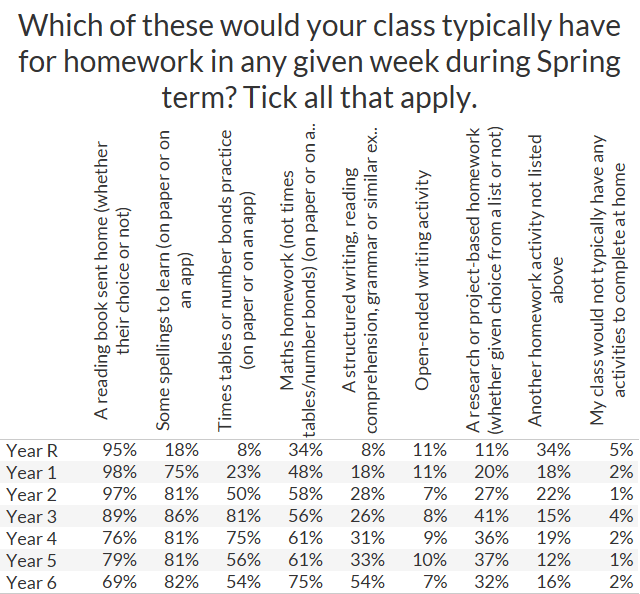
Pupils at independent schools are less likely to get given homework projects and reading, but instead get maths and structured writing. Pupils from the schools in particularly poor areas are the least likely to get these activities. Does this matter? Again, thoughts appreciated on this one. (Do email or tweet).
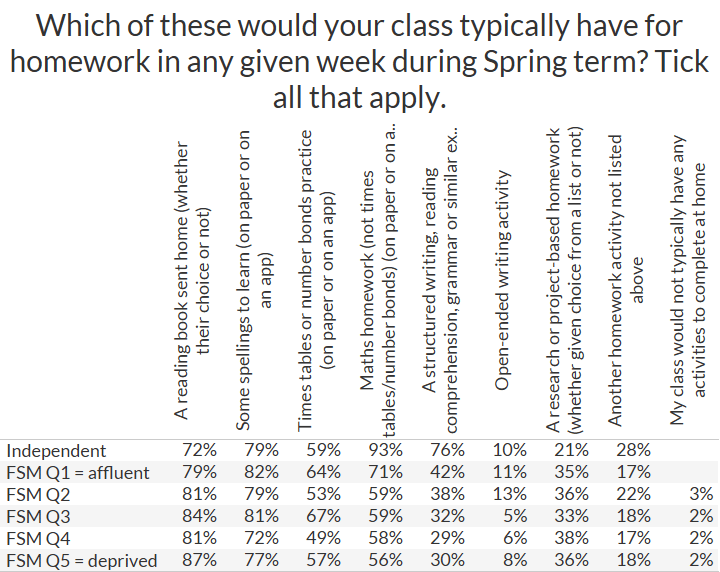
6. Finally, we know you love the tips, so here they are for last week…
- DNA-based predictions of how well children will do at school
- Cognitive bias in decision-making
- Do you speak to adults like they are your students?
- Green space and mental health
- Pen licences and similar rewards
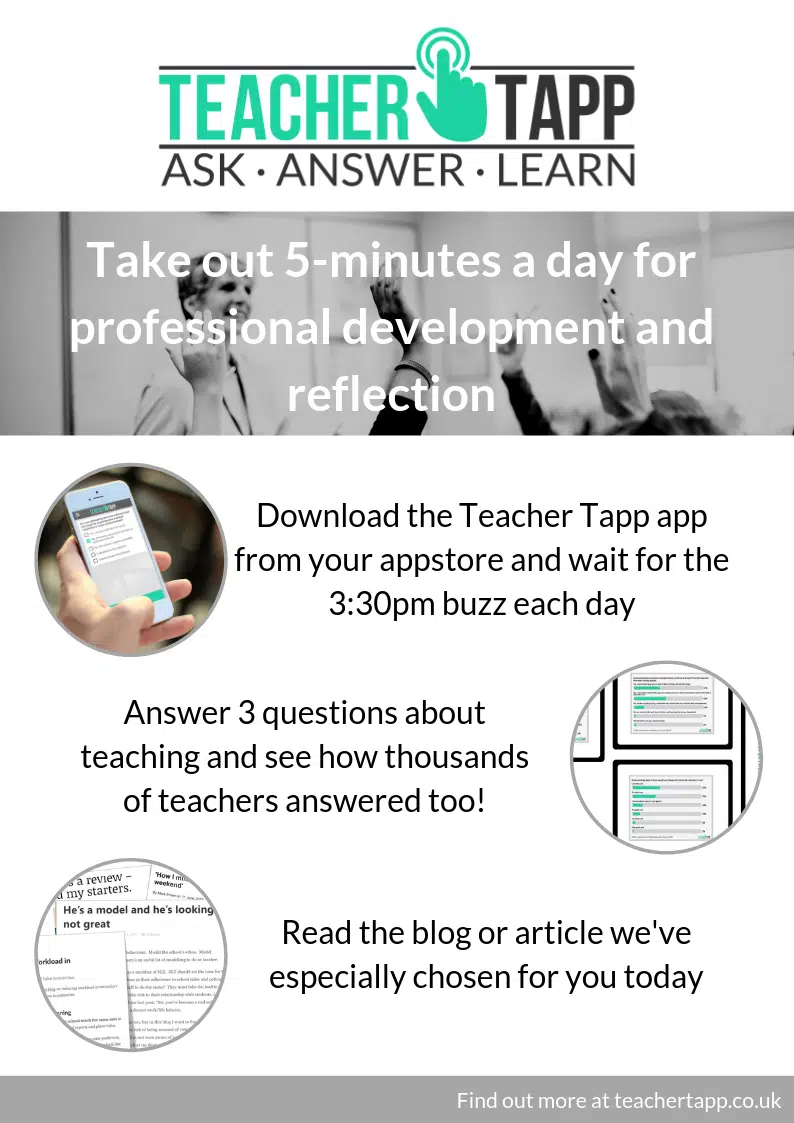
And don’t forget to tell your teaching colleagues all about Teacher Tapp!





